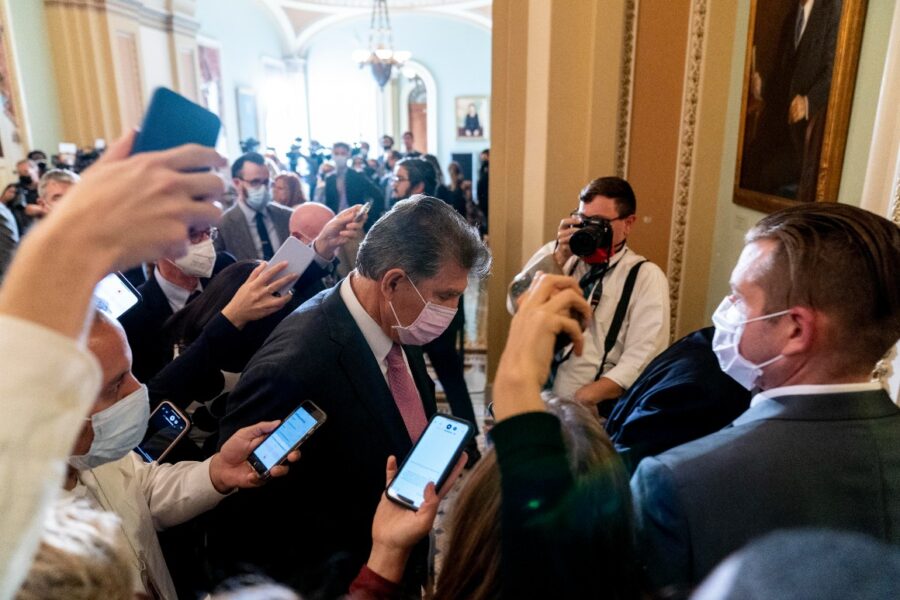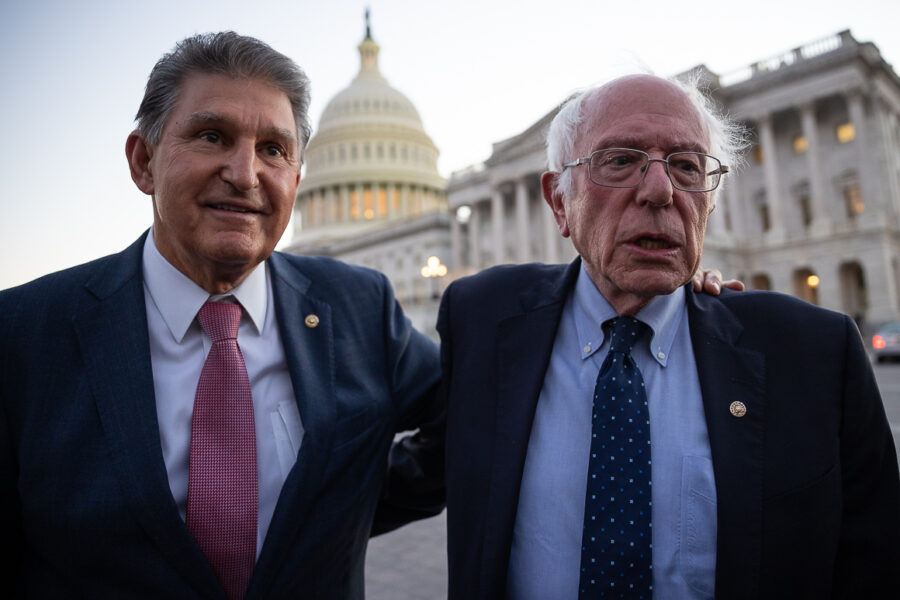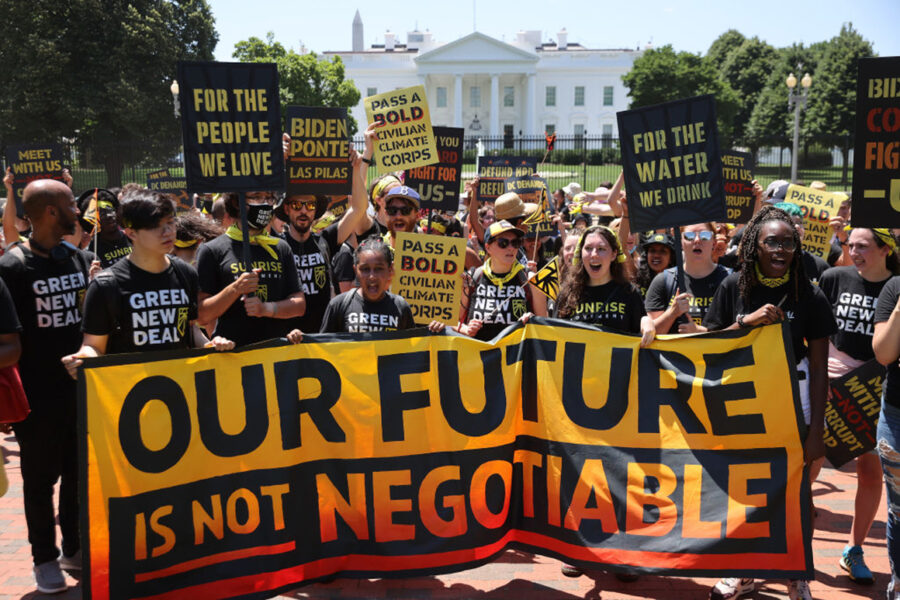Dems scramble for climate Plan C as Manchin dashes their dreams

Joe Manchin is hearing a dire pitch from his colleagues: Don’t blow our chance to save the world.
After Manchin rejected a centerpiece of President Joe Biden’s climate plan and rebuffed a separate carbon tax Tuesday, Senate Democrats are urgently pressing their West Virginia colleague for an alternative. Biden and Democrats are trying to clinch a deal on Biden’s larger social spending bill, but the climate plank has become a serious question mark due to Manchin. And some progressives are reiterating they won’t support any bill that doesn’t have a strong climate component.
Manchin is reluctant to embrace anything that could significantly disadvantage West Virginia’s gas and coal industry. Though he is endorsing some lower-tier clean energy investments, those fall far short of the two big ideas his colleagues have championed: a program encouraging utilities to cut emissions and a carbon tax. Now, there’s enormous pressure on Democrats to get Manchin on board with what could be Democrats’ only chance in a decade or more to enact consequential climate policies.
“Sen. Manchin has to balance the fact that he may have certain opinions, but he also has a responsibility as a chairman in the Democratic caucus, of the Energy and Natural Resources Committee,” said Sen. Martin Heinrich (D-N.M.), who spoke privately with Manchin after his declaration on Tuesday that the carbon tax was “off the board.”
“So he has to be both true to his positions and his own state, and also take that responsibility to the caucus seriously,” Heinrich added.
For Manchin, the moment is a culmination of his career as a stick in the mud for his party’s climate policies — a position that’s helped him win reelection. After all, he literally shot a hole through Democrats’ cap-and-trade bill in 2010 in one of his ads. The Senate is evenly split, so Democrats need him to advance their legislation, but some fear he’s intent on whittling down the climate component too much for them to stomach.
Democrats don’t have a lot of time to continue debating as Biden and party leaders seek an agreement with Manchin by the end of the month. Whatever Democrats can get through Congress on climate will be far more durable than anything Biden can do through executive action, so lawmakers are determined to convince Manchin now, before they could lose their majorities.
“Of course, it’s frustrating. But it’s also just part of negotiation,” said Sen. Debbie Stabenow (D-Mich.) of the state of talks with Manchin.
Manchin is aware of how sensitive the issue is for his colleagues. After his conversation with Heinrich, Manchin initially demurred: “The more I talk, the more everyone gets pissed off. So I’m going to quit talking.” But later, when approached in the Senate basement, Manchin rebuffed any suggestion that he’s trying to sink the climate change component of his party’s bill.
“My God, absolutely. Criminy,” Manchin said of whether he wants a strong climate component. “The bottom line is, and I’ve been saying from day one: Innovation, not elimination.”

He went on to say that because of a rise in emissions worldwide and continued construction of power plants outside the U.S., the Senate has “got to find an answer for carbon capture in some way, shape or form.” Currently, carbon capture technology is expensive and unproven to work at the scale necessary to put a meaningful dent in the nation’s emissions footprint.
Beyond the $150 billion proposal to pay utilities to transition their energy sources and punish utilities that do not, dubbed the Clean Energy Performance Program, Democrats want to pour hundreds of billions of dollars into addressing climate change in their bill. The biggest bulk of emissions reductions they envision would come from tax credits to help deploy wind, solar and other clean energy sources, as well as electric vehicles.
They also want to fund a civilian climate corps to deploy young people in environmentally friendly projects. Other desired climate action provisions include a methane fee and massive investments in energy efficiency improvements.
“I’m disappointed he’s not agreeing to the biggest game-changer for climate change. But there are about $300 billion in other provisions,” Sen. Mazie Hirono (D-Hawaii) said of Manchin. She added that “I think he will support some of the other provisions, maybe not to the extent” that his Democratic colleagues want.
Worsening scientific warnings of climate change’s toll are driving the urgency among the Democratic rank-and-file. A United Nations report this summer, dubbed a code red for the planet, found a 1.1 degrees Celsius of warming already baked in since the pre-industrial era due to burning of fossil fuels like coal, natural gas and oil.
Many Democrats remain doubtful that they’ll ultimately be able to get Manchin on board with the scale of climate investments they want. Majority Whip Dick Durbin said Tuesday he was unsure of how the party-line bill would treat climate change.
“I hope that there are areas — I think there are areas — where we can find some agreement,” Durbin told reporters. “There are some things he doesn’t agree with — clean electricity is one of them.”
Privately, Democrats are scrambling to produce something big that can win Manchin’s vote. One environmental advocate close to the negotiations told POLITICO a “Plan C” on climate change could involve pouring tons more money into grants, loan guarantees and other programs aimed at curbing emissions.
Sen. Jon Tester (D-Mont.) said that plowing more money into research and development could do the trick: “There are things that make a big difference that Joe would agree to.” And Sen. Angus King (I-Maine) said that increasing energy storage could be feasible to Manchin.
“He’s been more receptive to climate-related legislation this year than I expected given [he’s from] a coal state and all that history,” King said.
That still leaves Democratic leaders with a dilemma, since backing a deal that leans heavily on voluntary and research programs almost surely will disappoint climate advocates on and off the Hill. Dozens of Democrats have vowed for months to oppose legislation insufficiently strong on climate provisions under the tagline of “no climate, no deal.”
Beyond the scientific realities, though, lie political ones. Democrats are anxious for Biden to show up at global climate negotiations in early November with proof the U.S. can be counted on to follow through on its emissions-combating commitments. The fear is that, without a national program for clean electricity or an economy-wide carbon tax, other nations won’t buy the president’s rhetoric.

Sen. Chris Murphy (D-Conn.) said this week that he can’t support a reconciliation bill without a climate component. But he contended that his party can still go big without a carbon tax or a new major clean energy transition program, by increasing tax incentives for clean energy and using “other taxing powers beyond a broad carbon tax.”
Sen. Chris Coons (D-Del.), who co-chairs the bipartisan Senate Climate Solution Caucus, said that Democrats are having “purposeful conversations this week” aimed at hashing out “the most possible path forward.”
Manchin has been urging the House to pass the Senate’s bipartisan infrastructure bill, which pours billions into climate resiliency. He says if that can pass before Biden heads to the Glasgow climate talks, it will demonstrate to the world that the U.S. is serious.
But many Democrats say that’s not enough.
“Resiliency is not a solution; resiliency is treatment. If you have heart disease, yes, you need treatment for that. But it’s better off to have a healthy heart,” Heinrich said. “And that’s what climate policy is about.”
Go To Source
Author: POLITICO

